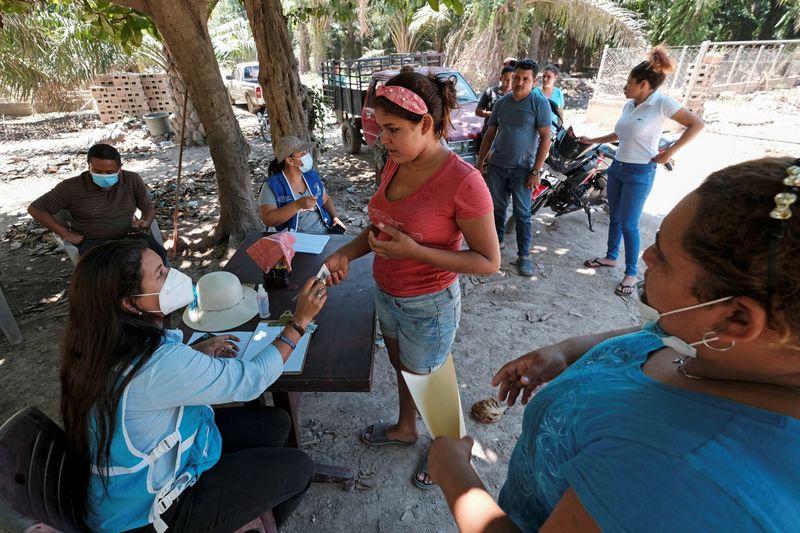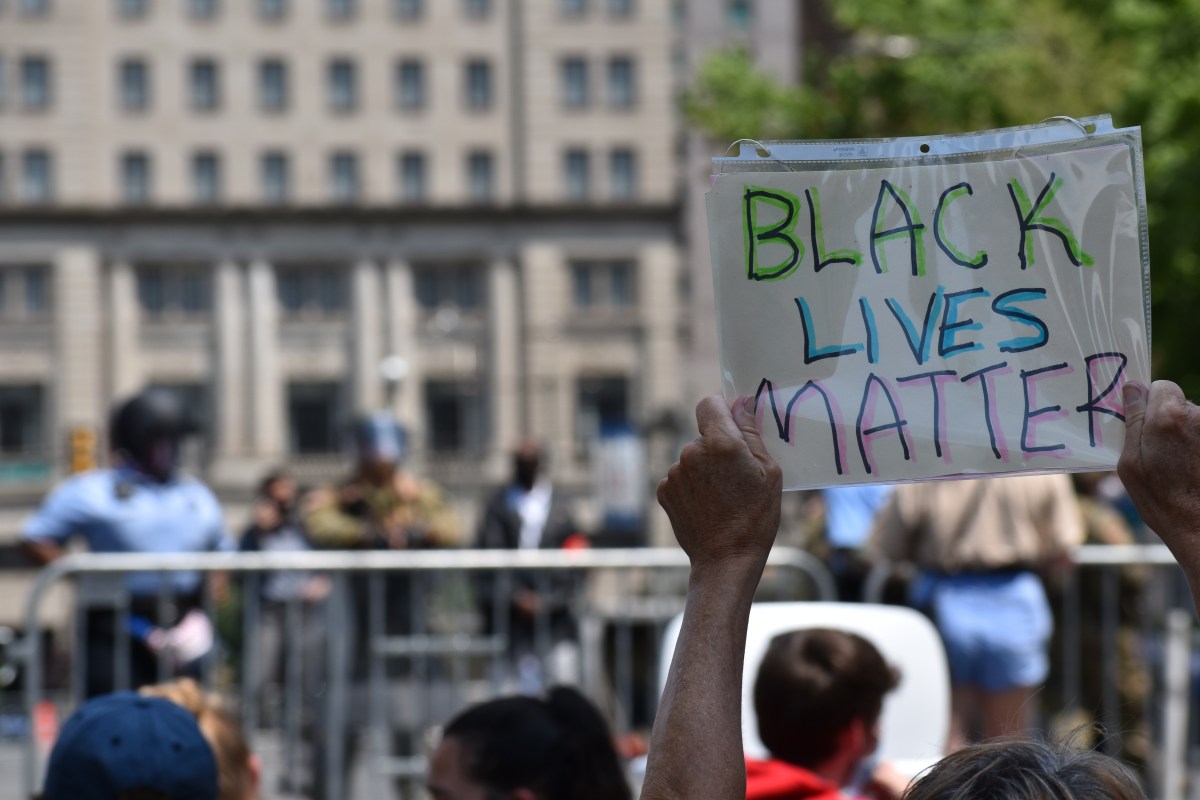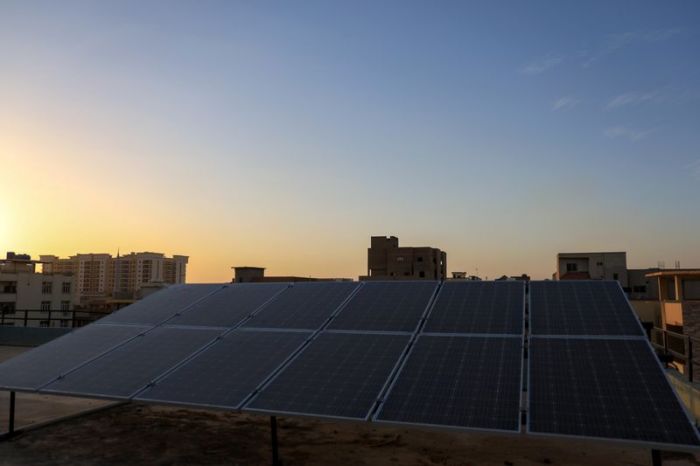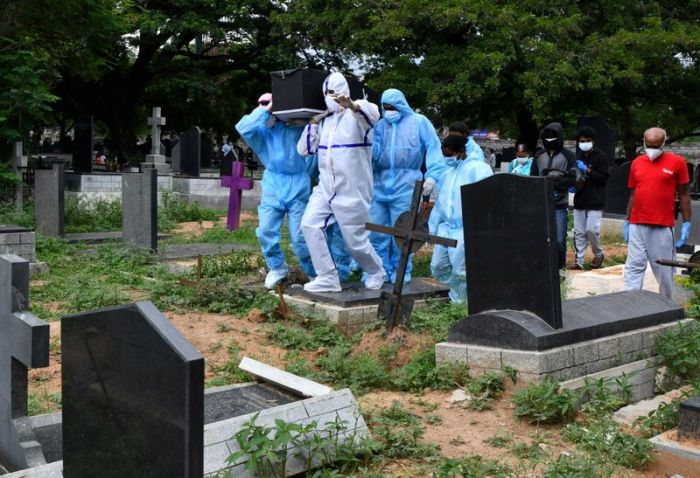SAN PEDRO SULA, Honduras (Reuters) – Bags of rice and beans arrived in a tough neighborhood in San Pedro Sula, Honduras’ second-largest city, government aid for poor residents struggling during a coronavirus lockdown in April 2020.
Cesar López and his hungry family got nothing. The food, he said, went only to supporters of the ruling National Party, which he opposes. He said it’s much the same for government jobs and other benefits.
López set out for the United States earlier this year – motivated in part by what he claims was unfair distribution of assistance during a hunger crisis caused by the pandemic and two hurricanes last year.
“The government only gives to its supporters,” López told Reuters in March, taking a break in a Guatemalan village on his way to Texas.
The ruling party denies playing favorites and said such allegations are typical of opponents aiming to make President Juan Orlando Hernández look bad. What is undisputed is that the conservative National Party, since seizing power in the wake of a 2009 military coup, has built a formidable political machine that wields great influence over the lives of Honduras’ 10 million people.
The patronage system, known as “clientelism,” helps fuel migration to the United States by breeding cynicism among those deprived of public benefits, said migrants and policy specialists.
“Sometimes the balance between staying and leaving is hope things could get better, and clientelism destroys that hope,” said Andrew Seele, president of the Washington-based Migration Policy Institute, which supports liberal immigration policies.
The National Party routinely uses its control of government institutions and funds to reward supporters, punish opponents and influence elections, according to Reuters interviews with two dozen current and former government officials, opposition politicians, former National Party insiders, diplomats, anti-corruption investigators and academics.
Another three dozen Hondurans – some en route to the United States – told Reuters that the system influenced them or their relatives to migrate.
Corruption is ingrained in Central America. For years, politicians have been embroiled in graft scandals and drug-trafficking prosecutions. The Biden administration has made targeting corruption central to its $4-billion strategy to address “root causes” driving migration from the so-called Northern Triangle countries of Honduras, Guatemala and El Salvador.
Economist Julio César Raudales served as minister for planning and external cooperation in the National Party-led government from 2010 to 2014. He said anti-poverty spending was directed mostly to areas where the party had the best chance of winning elections, though top party officials didn’t openly discuss the practice at cabinet meetings.
“All the public investments passed through my office, so it wasn’t difficult to see,” said Raudales, now a vice-rector of international relations at The National Autonomous University of Honduras.
While the practice isn’t new, it has become “shameless” under National Party rule, he said.
The party dismissed allegations that it doles out aid based on political support.
“This is totally false,” said Fernando Anduray, a spokesman and executive secretary of the party’s political commission.
Honduran law requires the federal government to involve municipalities in implementing social programs. The National Party captured 58% of the nation’s mayor’s offices in the most recent elections in 2017. Anduray said any instances of local officials favoring National Party supporters were isolated cases.
FLOURISHING PATRONAGE
Clientelism has a long history in Latin America. Authoritarian parties including Venezuela’s ruling Socialist Party and Mexico’s PRI, which held power for seven decades until 2000, have used it to wield influence, political scientists say. So has the National Party’s longtime rival in Honduras, the Liberal Party.
“We’re all complicit,” said Juan Carlos Elvir, a Liberal Party vice-presidential candidate for November’s election. The country’s welfare programs, he said, force citizens to rely on political parties for aid, an impediment to fighting poverty.
Supporting the ruling party doesn’t guarantee cash or food, nor does opposing it necessarily mean a permanent loss of public benefits, political analysts and residents said.
Still, Honduran migrants said the practice has become particularly disheartening in the upheaval of the past year – and a factor in their decision to leave.
Maria Garcia, who set out for the United States in February with her two young children, said she got none of the food assistance that trickled into her town in southwestern Honduras.
“Only those with (the president) receive help,” said Garcia, a supporter of the Liberal Party. She spoke to Reuters at the Guatemala-Mexico border.
The presidency, in a statement, said Hernández’s goal is to dispense social aid independent of political affiliations.
Anti-corruption investigators and academics who have studied Honduras say access to all manner of state benefits – from food handouts to multimillion-dollar public contracts – requires fealty to the National Party.
The party’s dozen years in power have allowed it to expand and consolidate such practices, studies show.
A 2019 report by the Latin American Public Opinion Project at Vanderbilt University found Honduras had the second-highest level of clientelism in Latin America, after the Dominican Republic. The study found that more than 18% of 1,561 Honduran voters surveyed in 2014 said they were offered a gift, favor or benefit in exchange for their vote in the 2013 presidential election. The survey, however, did not state which political parties made the alleged offers.
Local National Party activists are in charge of dispensing government welfare programs, which are then used to cement support from poor citizens ahead of elections, according to a March 2021 report by the Honduran Documentation Center, a Tegucigalpa-based private think-tank, with support from the National Democratic Institute, a U.S. pro-democracy group.
VOTING WITH THEIR FEET
Mauricio Arias said he has witnessed this arrangement as mayor of the western Honduras town of Copán Ruinas. A member of the opposition Liberal Party, Arias said his administration is excluded from decision-making about a federal assistance program called “Vida Mejor” or “Better Life.” He said local National Party operatives decide who gets help, directing most of the aid to the party’s base of voters.
Following Hernández’s victory in 2013, the government rolled out distribution of food parcels known as “bolsa solidaria” or “solidarity bag.” The government aid was largely channeled to citizens identified in an internal party “census” as likely National Party voters, said Raúl Pineda Alvarado, a former National Party lawmaker.
“If you are not in the census, you don’t have access to the solidarity bag,” added Alvarado, who now works as a political analyst.
Anduray, the National Party spokesman, said the party had an extensive database of its members and supporters. He denied the party discriminates against opposition voters in handing out cash assistance.
Among those helping the ruling party forge connections with voters are foot soldiers like Sogeri López, a long-time supporter in Chamelecón, a suburb of San Pedro Sula.
Ahead of the March primaries this year, she said, the National Party offered her a stipend to door-knock in her neighborhood, which was clobbered by November’s hurricanes.
López said her job was to obtain contact information from likely party supporters to help mobilize turnout. In addition, she said, she was instructed to tell voters they’d receive food, new mattresses and building materials to repair their homes.
The National Party “promised aid in exchange for people’s votes,” she said. López said she was also told her canvassing would lead to a job for her 21-year-old son Daniel.
The National Party’s Anduray said it would have been an “isolated case” if any such promises were made. “It is not a strategy of the party,” he said.
López has since grown disillusioned.
She said some of the handouts she’d promised voters never arrived. Neither did her stipend or the job for Daniel, who headed north last month in hopes of reaching the United States.
(Reporting by Laura Gottesdiener in La Técnica, Guatemala and Copán Ruinas, Honduras, and Drazen Jorgic in San Pedro Sula; additional reporting by Gustavo Palencia in Tegucigalpa and Frank Jack Daniel in Mexico City; editing by Marla Dickerson)




























